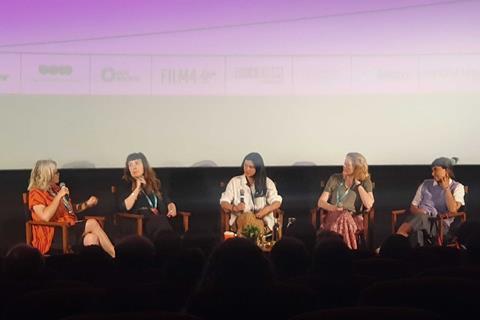
The BFI Film Fund is changing the way it assesses and responds to funding applications, according to Mia Bays, director of the Fund.
“We’re in the middle of changing it, somewhat democratising it,” said Bays, speaking on a panel at Sundance London film festival alongside fellow funding representatives Farhana Bhula from Film4, Jordan McGarry from Film London and Claudia Yusef from BBC Film.
“I don’t want to do it the way it’s often done,” said Bays. “I’ve described myself as a host body: I’m representing the industry, but also the audience. I’m quite resistant to [funding a title] just because I love it.”
“None of us know anything, as William Goldman said, and that’s still really true,” said Bays of the need for multiple voices in funding decisions. “You can miss things, you don’t get them, because we all project our personal experience into everything. It’s a blind spot; we have total biases, and it can really help some projects and can hamstring other projects.”
“This job is not so much about the specifics of what the slate looks like,” continued Bays. “[It’s important] that it’s fair, that we really have a multitude of voices making decisions, that we have a process that’s rigorous, and sometimes may involve outside voices, that may be specific from the demographic that the film is representing.”
“We’re looking at the process and how we decide [what to fund] – to make it as fair as possible, and to let people applying know that – sp that it isn’t mysterious, so people know how many people have looked at something, and know that there is rigour in it.”
‘Two ticks’
Bays also addressed the ‘two ticks’ label in the UK funding ecosystem, by which many projects receiving backing from two of the three main organisations, the BFI, as well as the film arms of broadcasters, BBC Film and FIlm4. . “It’s not part of the criteria [to already have support from another fund] - it’s just the reality of the market at the moment,” said Bays. “It depends on what the project is, on the crew, on lots of factors.”
The panel also discussed the relationships between the funds. “We typically don’t fully finance, so it’s great that this system exists where we can work together,” said Bhula, who joined Film4 as senior commissioning executive last year, having spent two years at the BFI Film Fund. “There’s some overlapping; we also are building our own relationships, we have our own development execs who go out talent scouting and generating ideas. We’re all doing that within our own organisations.”
McGarry allowed the possibility of a return for Film London’s popular low-budget Microwave funding scheme, describing the scheme as “dormant at the moment.”

























No comments yet